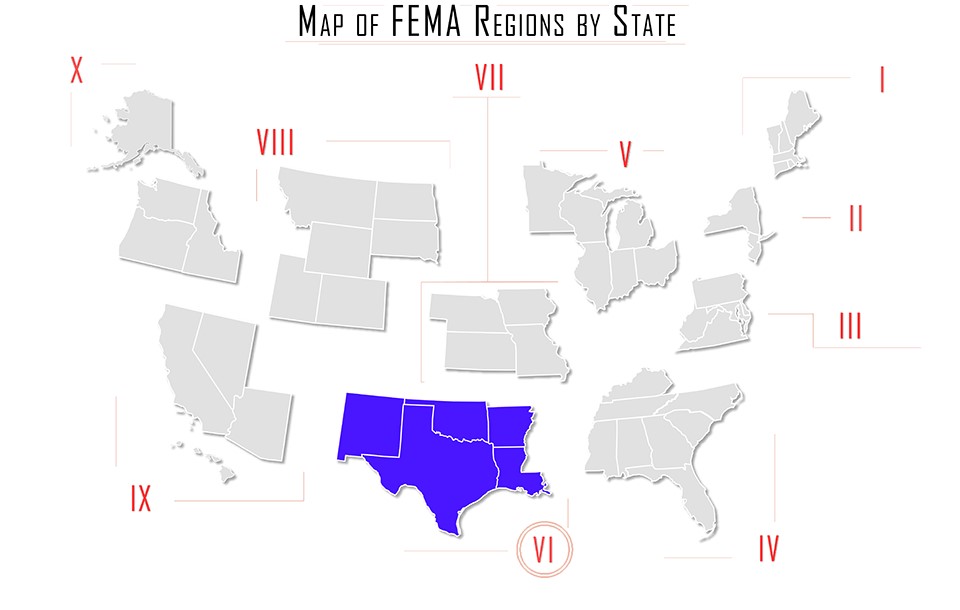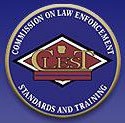.png)
At the Region is an ongoing feature that discusses the state-by-state training, certification and employment requirements of first responder departments across the nation. In this issue, At the Region looks at requirements for law enforcement officers in FEMA Region VI: Arkansas, Louisiana, New Mexico, Oklahoma, and Texas.

Law enforcement includes an extremely diverse range of agencies dedicated to promoting safety and public order through the application of national and regional laws and regulations. The variation of laws and penalties nationally and internationally necessitates region-specific training and specialization, while at the same time, officers must be familiar with overarching legislation and judicial decisions governing procedure and jurisdictional reach. This applies to agencies at the federal, state, county, and municipal levels, all of whom serve and protect their constituency in a dangerous field that exists within a complex and challenging framework.

Arkansas
The Arkansas Commission on Law Enforcement Standards and Training (CLEST) establishes minimum selection and training standards for admission to employment as a law enforcement officer in Arkansas. All applicants for law enforcement positions must meet the requirements established by CLEST and complete CLEST approved training to obtain their certification. The Standards Division oversees employment, training, and certification requirements established by the CLEST. Their mission is “to continue to upgrade law enforcement through assistance to municipal, county, and state agencies in training and the certification of law enforcement officers employed by the agencies both full-time and part-time.” No person will be appointed as a law enforcement officer, except on a temporary basis not to exceed nine (9) months, unless the person has satisfactorily completed a program of police training at a school approved by the commission. To complete the certification process, newly employed full-time officers must complete the Law Enforcement Basic Training Course within the first 6 months of hire. All law enforcement officers and county corrections officers must also complete the Mandatory Firearms Training Course.
Every officer employed by a law enforcement unit shall:
• Be a citizen of the United States
• Be at least 21 years of age
• Be fingerprinted and a search initiated of state and national fingerprint files to disclose any criminal record
• Be free of a felony record. A felony record means having entered a plea of guilty, been found guilty, or otherwise having been convicted of an offense, the punishment for which could have been imprisonment in a federal penitentiary or a state penitentiary. The fact that an individual has received a pardon, or their record has been expunged does not release the individual from having a felony record
• Be of good character as determined by a thorough background investigation
• Be a high school graduate or have passed the General Education Development (GED) Test indicating high school graduation level
• Be examined by a licensed physician and meet the physical requirements
• Be interviewed personally prior to employment by the department head or his representative, or representatives to determine such things as the applicant’s motivation, appearance, demeanor, attitude and ability to communicate
• Be examined by an individual licensed to practice psychiatry or psychology and qualified to perform such evaluations in the State of Arkansas, who after examination finds the officer to be competent and recommends the agency hire the individual
• Possess a valid driver’s license
• Successfully complete a CLEST firearms qualification and review departmental policies, specifically policies covering the use of force, criminal law, and emergency vehicle operations. (No officer may carry a firearm in the course of employment or in the performance of official duties until this requirement is met and documented on the Initial Employment Report (F-1) submitted to the Office of Law Enforcement Standards
• For continued employment, must successfully complete a minimum of sixteen (16 hours of CLEST certified training annually, to include firearms qualification and racial profiling
• Be free of a misdemeanor domestic violence conviction, in accordance with 18 USC section 922
You can find more detail on these requirements here.
Veterans to Law Enforcement
The CLEST also administers a program called Veterans to Law Enforcement. In this program, qualified military veterans interested in pursuing a career in law enforcement can attend the police academy. Eligibility requirements are as follows:
• Served at least six (6) months active duty in the armed services within ten (10) years prior to application
• Meet minimum standards as required of an Arkansas law enforcement officer as specified in CLEST Regulation 1002
• Pay the non-refundable cost of the training prior to attending the basic training course
• The Director of CLEST will be the final approving authority for an applicant’s acceptance into the program
Veterans that fail any portion of the basic police training course are ineligible to attend another course for a 24-month period and are no longer eligible to apply for the Veterans to Law Enforcement program. Veterans that successfully complete the basic police training course must begin employment with a law enforcement agency as a full-time or part-time officer within three (3) years of the date of the completion of the basic training course for the training to remain valid.
Reciprocity
The commission can issue a waiver for equivalent training upon presentation of documentary evidence by a department that an officer has satisfactorily completed equivalent training.
• Training received in a state with laws governing or regulating law enforcement training must, if subject to such review, have been approved or certified in the state in which the training was received
• The Commission may elect to prescribe as a condition of certification the satisfactory completion of the Law Enforcement Officer Refresher Course or other supplementary or remedial training necessary to equate previous training with current standards
• For certification purposes, those Full-time Law Enforcement Officers who have not met the minimum classroom hours of training, but have accumulated at least 50% of the required hours may, at the discretion of the Commission, receive ten (10) classroom hours of credit for each year of Full-time law enforcement experience
• Those who qualify for this equivalent training waiver will be required to satisfactorily complete the Law Enforcement Refresher Course
• Where approved by the Commission, individuals who meet all other requirements of certification, and who receive a waiver under this regulation, shall be entitled to certification after the completion of the appropriate probationary period.

Louisiana
The Louisiana Peace Officer Standards and Training Council (POST) develops training standards for peace officers in the State of Louisiana. The Council is responsible for developing and evaluating the curriculum of mandatory basic training courses for municipal officers, deputy sheriffs, state police, wildlife agents and all other persons commissioned as peace officers, defined by state law.
Minimum standards set by POST include the following musts:
• Be at least 20 years of age
• Be a United States citizen
• Have a high school diploma or GED
• Be able to meet the physical demands to perform the duties of a police officer
• Have 20/20 corrected vision, not greater than 20/100 uncorrected vision, and you must not have any color blindness
• Have normal hearing
• Not have a criminal history
• Possess a valid driver’s license
• Have no physical limitations or deformities that would prohibit you from completing the duties of a police officer
• Undergo a polygraph interview and examination
• Pass a physical fitness evaluation consisting of a 1.5-mile run, push-ups, sit-ups, and an obstacle course
• Submit to a background investigation
• Participate in an oral interview
• Undergo a medical and psychological examination.
Reciprocity
Officers wishing to transfer from out of state may be eligible for certification by meeting the following requirements at an accredited academy:
• Present a valid out-of-state POST certificate of training
• Successfully complete the Louisiana Law Enforcement Basic Training Manual, "Legal Aspects" Section, and Firearms section, and qualify on the POST firearms qualification course
• Qualify on the POST firearms qualification course, as attested to by a certified firearms instructor
• Pass the statewide examination for peace officers with a minimum score of 70%.
If there has been an interruption of service in excess of five years, the officer is required to attend the full basic academy.

New Mexico
The Training and Recruiting Division of the New Mexico Law Enforcement Academy Board, under the Department of Public Safety establish rules, policies, qualifications, and standards for the employment, certification, and training of law enforcement officers and ensures compliance with the New Mexico Law Enforcement Academy Board Rules.
Minimum requirements to become a police officer in New Mexico:
• Be 21 years of age at the time of your academy graduation
• Have a high school diploma or GED
• Have a valid New Mexico driver’s license
• Be a U.S. citizen
• Have no felonies, frequent criminal activity or improper conduct on your record and you must have an excellent driver history
• Completed at least 60 hours of college credits (any course) or…
• attend San Juan college and receive 30 hours of credits and complete the other 30 after graduation (discussed below) or…
• complete 30 college hours and attend the academy which will be accredited 30 college hours.
For enrollment in the New Mexico Department of Public Safety Training Center’s Basic Police Officer Training Program, or New Mexico Regional Academy Program, applicants must submit a complete Basic Police Officer Training Application Packet.
Reciprocity
New Mexico has a waiver process to become a certified peace officer for those individuals whom the Board has previously certified but whose certification has become inactive or for those individuals who have functioned as a peace officer in another state or with the federal government whose training and experience substantially conform to the basic course curriculum of New Mexico.
Every applicant for certification by waiver of previous training must meet all qualifications and requirements as established in New Mexico statutes and New Mexico Law Enforcement Academy Board administrative rules. Any previously certified New Mexico peace officer must attend the Certification by Waiver program if they have been out of commissioned law enforcement for more than two (2) years without six (6) consecutive months of service. Any applicant who has not been employed as a full-time law enforcement officer for a period in excess of eight (8) years must attend the basic police officer training program to become certified.
The Director may consider the applicant’s certified law enforcement experience and give credit of 40 hours per year for each year of service, up to but not to exceed ten (10) years, for a total of 400 hours and, the applicant will receive credit for advanced training, up to but not to exceed 400 hours. Applicant experience and training must be equivalent to the current minimum standards of training curriculum in effect at the time of application, which is currently 824 hours, unless such deficiencies are covered in the Certification by Waiver Program. For those wanting to challenge the exam, more information and exam dates can be found here.

Oklahoma
The Oklahoma Council on Law Enforcement Education and Training (CLEET) is established under Oklahoma Law to provide for basic peace officer certification, establishing and conducting basic academies for all full-time peace officers employed by city, county, or state entities of government, with the exception of approved academy agencies. CLEET also provides for basic reserve officer certification for reserve peace officers employed by city, county, or state entities of government, by providing the curriculum, setting minimum standards, and by administrative oversight.
In order to complete CLEET approved certification training, officers must meet, at a minimum, the following conditions:
• Be at least 21 years of age prior to certification as a peace officer
• Must be a United States citizen or in resident alien status, as defined by U.S. Citizenship and Immigration Services
• Must possess a high school diploma or a GED equivalency certificate
• Must not have been convicted in state or federal court for any felony, crime of moral turpitude, or a crime of domestic violence
• Must have fingerprint clearance from Federal Bureau of Investigation and the Oklahoma State Bureau of Investigation
• Must have undergone psychological evaluation by the employing agency using a psychological instrument approved by CLEET
• Must be commissioned or appointed by employing agency prior to attending CLEET approved certification training
• Must not have been involuntarily committed to an Oklahoma state mental institution
• Must certify that he or she is physically able to fully participate in and complete all phases of the CLEET Basic Peace Officer Certification Academy as mandated in CLEET rules
• Must submit all required documentation and enrollment materials.
Reciprocity
Any officer seeking Oklahoma Peace Officer Certification, who has been certified by a state peace officer standards and training agency as a peace officer in another state, or any officer who has been certified as a federal peace officer by a Council recognized federal law enforcement agency, may obtain certification by reciprocity, under the following conditions:
• The officer must meet the minimum peace officer employment standards set forth by law
• The officer must have been employed as a full time peace officer for at least three (3) months within the two (2) year period immediately preceding the request for Oklahoma certification
• The officer must attend training as specified by CLEET
• The officer must successfully pass a certification examination which is designed to be scored by functional area blocks, with the exception of skills training functional areas which shall not be tested. Officers must pass every functional area block tested at a standard prescribed by the Council. Officers may have one retest for each functional area block which they fail
• If an officer fails both a block test and a retest for any given functional area, then that officer must successfully complete the corresponding functional area in a CLEET Basic Academy, to include successfully passing the block examination(s). Any retest would follow the guidelines listed in OAC 390:15-1-13.

Texas
The Texas Commission on Law Enforcement (TCOLES) is the state agency that certifies law enforcement officers in the state. To become licensed as a peace officer in Texas applicants must successfully complete the basic licensing course, pass the state licensing examination; and be appointed by a law enforcement agency. Minimum requirements to attempt to gain a license include:
• For peace officers and public security officers, is 21 years of age; or 18 years of age if the applicant has received:
o an associate's degree; or 60 semester hours of credit from an accredited college or university; or has received an honorable discharge from the armed forces of the United States after at least two years of active service;
• has passed a general educational development (GED) test indicating high school graduation level; or holds a high school diploma;
• fingerprinted and is subjected to a search of local, state and U.S. national records and fingerprint files to disclose any criminal record;
• has never been on court-ordered community supervision or probation for any criminal offense above the grade of Class B misdemeanor or a Class B misdemeanor within the last ten years from the date of the court order;
• is not currently charged with any criminal offense for which conviction would be a bar to licensure;
• has never been convicted of an offense above the grade of a Class B misdemeanor or a Class B misdemeanor within the last ten years;
• has never been convicted or placed on community supervision in any court of an offense involving family violence as defined under Chapter 71, Texas Family Code;
• is not prohibited by state or federal law from operating a motor vehicle;
• is not prohibited by state or federal law from possessing firearms or ammunition;
• has been subjected to a background investigation;
• examined by a physician, selected by the appointing or employing agency, who is licensed by the Texas Medical Board. The physician must be familiar with the duties appropriate to the type of license sought and appointment to be made. The appointee must be declared by that professional, on a form prescribed by the commission, within 180 days before the date of appointment by the agency to be:
o physically sound and free from any defect which may adversely affect the performance of duty appropriate to the type of license sought;
o show no trace of drug dependency or illegal drug use after a blood test or other medical test;
• examined by a psychologist, selected by the appointing, employing agency, or the academy, who is licensed by the Texas State Board of Examiners of Psychologists. This examination may also be conducted by a psychiatrist licensed by the Texas Medical Board. The psychologist or psychiatrist must be familiar with the duties appropriate to the type of license sought. The individual must be declared by that professional, on a form prescribed by the commission, to be in satisfactory psychological and emotional health to serve as the type of officer for which the license is sought.
• has never received a dishonorable or other discharge based on misconduct which bars future military service;
• has not had a commission license denied by final order or revoked;
• is not currently on suspension, or does not have a surrender of license currently in effect;
• meets the minimum training standards and passes the commission licensing examination for each license sought;
• is a U.S. citizen.
Reciprocity
If you are a law enforcement officer from other areas review the “Out of State/Federal Application.” To obtain Texas licensure you must meet all of the work, training and application requirements. You will be required to complete an initial application, including fingerprints through FAST, to determine your eligibility. Do not proceed to the next steps until you have received approval for eligibility, which TCOLES will send you by mail.
Once TCOLES approves your eligibility, the additional steps include:
• Successful completion of the Texas Supplemental Peace Officer course (1018) (instructions provided with eligibility approval);
• Successful completion of the TCOLE Rules Overview (1305) if eligibility form is received after June 1, 2014 (instructions provided with eligibility approval);
• Approval of the exam application, and receive endorsement from TCOLE (exam application provided only when eligibility is approved);
• Passing of the state licensing examination; and
• Appointment by a law enforcement agency within two years from the date of your passed examination.








